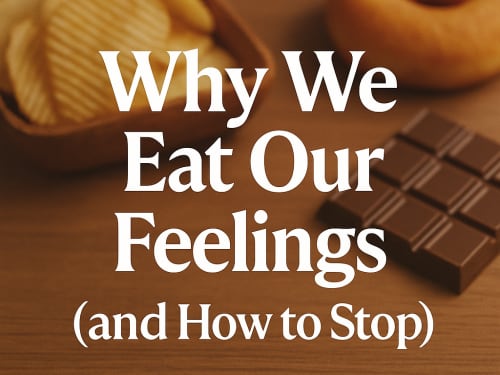Emotional Eating: Why We Do It and How to Cope

posted 1st October 2025
🍫 Emotional Eating: Why We Do It and How to Cope
Emotional eating happens when food is used to manage feelings rather than hunger. For some, it’s reaching for chocolate after a stressful day. For others, it may involve overeating, restricting, or bingeing as a way to cope with difficult emotions. While it can bring temporary comfort, it often creates an unhelpful cycle of stress, cravings, and guilt.
🧬 Stress and Emotional Eating
Our brains are still wired for survival. Thousands of years ago, when humans faced predators, the fight-or-flight response released cortisol and adrenaline to provide energy. Today, we rarely face physical danger, but our bodies react the same way to modern stressors like deadlines, conflict, or money worries.
Cortisol increases appetite, especially for sugary or fatty foods. Over time, this creates a cycle: stress → cravings→ emotional eating→temporary relief → more stress.
🧠 The Psychology Behind Emotional Eating
Psychologists have identified several reasons why emotions and eating are so closely linked:
- Comfort From the Start (Psychodynamic Theory): As babies, feeding meant comfort as well as nourishment. That link often carries into adulthood.
- Food as a Mood Fix (Affect Regulation Theory): We eat to ease stress or sadness, or to prolong happiness.
- When Dieting Backfires(Restraint Theory): Strict restriction often ends with bingeing, especially under stress.
- The Brain’s Reward System (Reward Theory): Sugary and fatty foods trigger dopamine, reinforcing the habit of eating for comfort.
📊 Emotional Eating by the Numbers
- 44.9% of people with overweight/obesity report emotional eating (Pérez et al., 2022).
- 20.5% of U.S. adults “often” or “very often” eat in response to distress (Harvard, 2021).
- 38% of adults reported stress-related overeating in the past month (APA, 2013).
- 64% of highly stressed participants engaged in emotional eating (Holländare et al., 2022).
- Among U.S. adolescents, 30% reported emotional eating, with higher rates among females (Mason et al., 2023).
🌿 Coping With Emotional Eating
Breaking the cycle isn’t about willpower; it’s about finding healthier strategies for managing emotions:
- Pause and check in: Ask yourself if you’re truly hungry or seeking comfort.
- Spot your triggers: Journaling can reveal patterns, such as work stress or boredom.
- Find alternatives: Try a walk, breathing exercise, or calling a friend.
- Eat mindfully: Notice taste, texture, and fullness cues to feel more satisfied.
- Stay balanced: Skipping meals or strict dieting makes cravings worse.
- Seek support: CBT and therapy can address underlying emotions; dietitians can provide practical guidance.
✨ Emotional eating is common, and it’s nothing to be ashamed of. By understanding why it happens and learning healthier coping tools, you can build resilience without relying on food for emotional comfort.
📚 References
American Psychological Association. (2013). Stress in America™: Are teens adopting adults’ stress habits? Retrieved from https://www.apa.org/news/press/releases/stress/2013/eating
Elmacıoğlu, F., Emiroğlu, E., Ünal, S., Özçelik, A. O., & Uçar, A. (2021). Emotional eating and negative emotional eating among university students: The role of gender. BMC Public Health, 21, 399. https://doi.org/10.1186/s12889-021-10531-3
Harvard Family Health Habits Survey. (2021). Emotional Eating and Coping with Stress. Harvard Medical School. Retrieved from https://info.primarycare.hms.harvard.edu/perspectives/articles/emotional-eating
Holländare, F., et al. (2022). Perceived stress and emotional eating: Evidence from a large cross-sectional study. Clinical Nutrition ESPEN, 49, 169–176. https://doi.org/10.1016/j.clnesp.2022.02.028
Mason, T. B., et al. (2023). Emotional eating across adolescence: Links with age, gender, and stress. Childhood Obesity, 19(5), 336–343. https://doi.org/10.1089/chi.2023.0184
Pérez, M. N., et al. (2022). Prevalence of emotional eating in overweight and obese populations: A meta-analysis. British Journal of Psychology, 113(3), 567–588. https://doi.org/10.1111/bjop.12768





